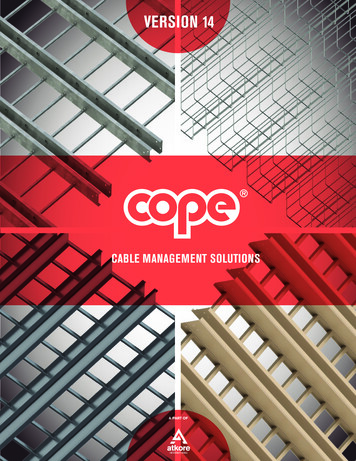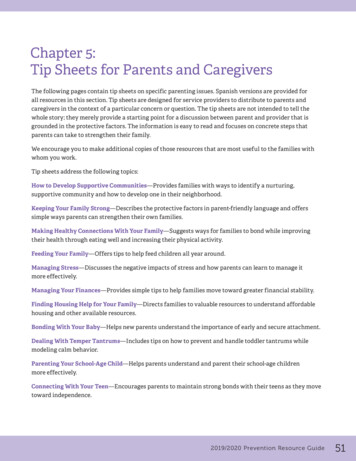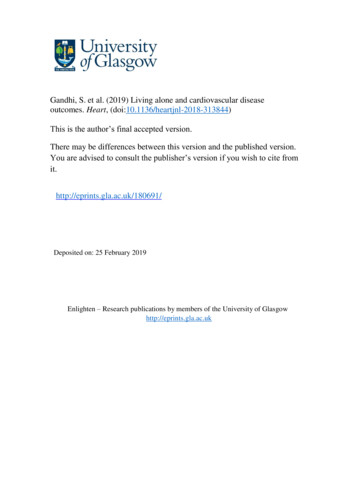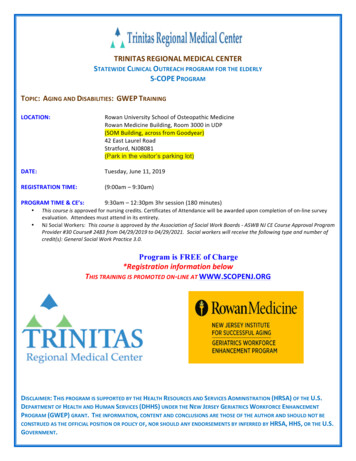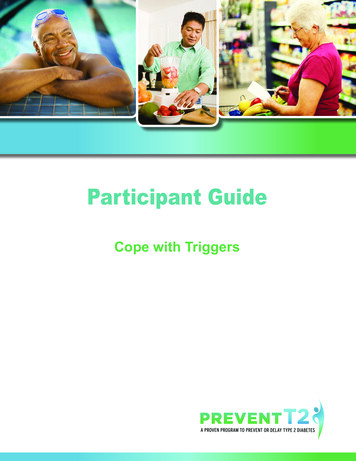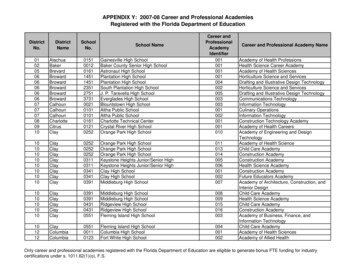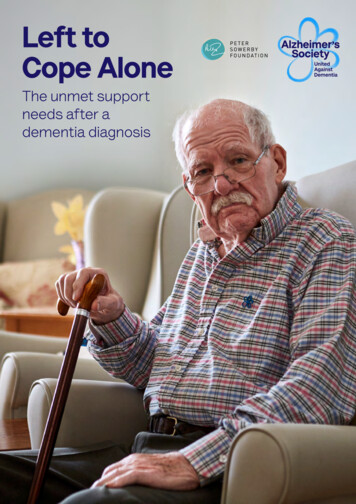
Transcription
Left toCope AloneThe unmet supportneeds after adementia diagnosis
Left to Cope AloneAcknowledgementsThis report was produced by Alzheimer’s Society andthe Peter Sowerby Foundation.Alzheimer’s Society would like to thank everyone whocontributed to this report – both professionals andpeople with lived experience – who talked openly aboutthe challenges they face.We would like to thank Professor Linda Clare, PrincipalInvestigator, and Dr Jayden van Horik, PostdoctoralResearch Fellow, of the Alzheimer’s Society-fundedresearch project Improving the experience of Dementiaand Enhancing Active Life (IDEAL) at the University ofExeter for providing comments on the draft manuscript.We would also like to extend particular thanks toProfessor Dame Louise Robinson, Principal Investigator,and Dr Alison Wheatley, Research Associate, of theAlzheimer’s Society-funded research project Primarycare-led post-diagnostic Dementia Care (PRIDEM) atthe University of Newcastle, for providing commentson the draft manuscript as well as their expertise andadvice throughout the development of the report.Lastly, we would like to thank members of our PolicyReference Group for providing feedback and guidanceon the report’s draft recommendations, includingDr Sophie Norris, Dr Mehran Javeed, Dr KrishnaveniVedavanam, Dr Alejandra Cases, Steve Shelley-Kingand Dr Rod Kersh.For a full list of thanks, see the Appendix.AuthorsKielan Arblaster, Senior Policy Officer – Health andIntegration, Alzheimer’s Society (primary author)Sharon Brennan, Policy Manager – Health andIntegration, Alzheimer’s SocietyContactTo find out more, please contact Kielan Arblaster byemailing policy@alzheimers.org.uk Copyright Alzheimer’s Society 2022. All rights reserved.No part of this work may be reproduced, downloaded,transmitted or stored in any medium without writtenpermission of the publisher, except for personal oreducational use. Commercial use is prohibited.June 20222
Left to Cope Alone3ContentsExecutive Summary4What needs to change?6Recommendations7Introduction9Are people’s post-diagnostic support needs being met?11Annual dementia review12Post-diagnostic support20What is the impact of support needs not being met?36Conclusion45Access to annual dementia reviewQuality of annual dementia reviewHolistic annual dementia reviewFrequency of annual dementia reviewInformation and dementia educationPerson-centred supportEmotional and mental health supportMaintaining independenceSymptom managementPeer support and social contactCare continuityCognitive stimulation and managing cognitive declineCarer supportHospital and mental health admissionCarer breakdownDeteriorationHow can crises be Best PracticeMethodology4856References60
Left to Cope Alone4Executive SummaryDementia is a complex condition crossing primary, secondary, community,acute and social care. This complexity inevitably leads to a lack of ownershipof the condition within the health and care system, which creates variation inthe quality and type of support people receive. Funding for dementia servicesis also often limited by cost and staff capacity meaning services cannotconsistently offer people with dementia the support they want and need.This report has sought the views and experiences of over 2,000 people affected by dementiato understand what support they need after diagnosis. It shows that people’s needsare holistic and wide-ranging, encompassing support for medical, emotional and socialwellbeing. Yet these needs are often not being met.We found people are regularly missing out on care that is timely and appropriate. This failureis having a negative impact on the wider system as well as on the quality of life of those livingwith the condition. For example, Hospital Episode Statistics for 2021-22 show that almostone third of people with dementia admitted to hospital stayed for a day or less.This suggests that better community support would be able to treat many of theseadmissions in the community, relieving pressure on NHS acute services. One system casestudy in our report projected it could save 2 million by reducing crises and costly admissionsthrough improved community support for people affected by dementia.People with dementia have been hardest hit by the pandemic, yet gaps in support wereevident long before Covid-19 with the pandemic acting to further widen these gaps. A keytheme from our evidence collection is that people struggle to access care and support whenthey need it, largely because services are so fragmented.One person with dementia told us:Different parts of the system do not seem to talk to each other. The memoryclinic tells you to contact your GP and then the GP tells you to contact thememory clinic. Social workers say that your relative should be entitled to areview, but then you can’t get a referral, and so on. It is like banging your headagainst a brick wall.There are national metrics, although limited, in England to assess earlier parts of the pathwaysuch as diagnosis. These diagnosis metrics are not centrally collected in Wales and NorthernIreland, meaning the experience of people with dementia also varies across the UnitedKingdom. Yet apart from annual dementia reviews, there are no other performance metricsin England that look at the effectiveness of the care and support offered after diagnosis.Perversely, the diagnosis rate metrics often force local health and care systems to shiftattention toward the start of the dementia pathway, leaving fewer resources for providingsupport after diagnosis.
Left to Cope Alone5This report shows that a diagnosis without sufficient post-diagnostic support leaves peopleliving with a complex and potentially devastating condition with limited understanding,capability or tools to cope with or manage its symptoms. One person caring for someonewith dementia told us:It is a lonely place to be because at every turn you are dealing with professionalswho mean well to support, but they exist in a system that is busy and understaffed.I felt exhausted mentally and physically and was rejected many times when all Iwanted was my father to be looked at as a person with complex needs.The complexity of dementia also means that when support needs go unmet, peopledeteriorate quicker and are more likely to experience a crisis. Our overarchingrecommendation is for everyone to have access to a dementia support worker or similarservice. These roles should be recruited in every primary care network to act as the initiallead professional and first point of contact. This would facilitate a smoother transitionbetween the memory service and primary care and reduce the pressure on general practice.It would also ensure people living with dementia have a single point of access to connectwith wider care and support services as their needs change and become more complex.This should be planned as the first step for integrated care systems to develop an overall‘stepped’ model of care where people can easily access specialist intervention within thecommunity to reduce crises.Given health inequalities have been exacerbated by Covid-19, areas with high ethnic minoritypopulations should also consider a community link worker component to these roles toreduce the disparities in support this report also highlights for ethnic minority communities.With the introduction of integrated care systems, combined with a new national dementiastrategy, there is now a real opportunity to improve the post-diagnostic support offered topeople living with this potentially devastating condition. Dementia must be recognised as apriority and given the resources it requires.
Left to Cope Alone6What needs tochange?The general post-diagnostic support pathway for people with dementia is thatthey will be diagnosed by a specialist – usually a memory assessment service– who may also provide immediate support after diagnosis. After some time,depending on the type of dementia diagnosed, people will then be dischargedfrom the memory assessment service to their GP, who will take over theirongoing care and support.1However, a lack of guidance around this stage of the pathway often leads to a postcodelottery of access to effective care and support.2,3 The complexity of dementia also requiresa multidisciplinary approach to support, including both health and care providers, which isfrequently lacking in primary care.4This report looks at what people affected by dementia want from support after diagnosisand the outcomes that are important to them. It finds that many people struggle to accessappropriate care and support for themselves and their families.A consistent theme of people’s experiences was fragmentation, in terms of both access to,and quality and timing of, support. This inevitably leads to people and their families beingunsupported, left to manage a complex, degenerative condition with little help. Recentresearch studies have shown similar findings.5,6,7The recently established integrated care systems are best placed to take ownership of localareas’ post-diagnostic support for people affected by dementia. Yet there is also a need fornational action to provide direction for improving dementia care locally.
Left to Cope AloneRecommendationsMain recommendation Ensure everyone diagnosed with dementia has access to a dementia supportworker or similar service. These roles should be featured as the first point ofcontact in every primary care network, with automatic referral from memoryservices. To reduce crises, the service should be delivered as part of an overall,integrated ‘stepped’ model of care where people can easily access more specialistintervention within the community as their needs become more complex. Theseroles should include a community link worker component in areas with a highethnic minority population. link worker component in areas with a high ethnic minoritypopulation.Annual dementia reviewNational National health systems in England, Wales and Northern Ireland should undertakea review of the Quality and Outcomes Framework (QOF), or its equivalent fundingmechanism, in collaboration with people affected by dementia. They shouldconsider additional indicators to support a more comprehensive, high-qualityannual dementia review. National health systems in England, Wales and Northern Ireland must publisha plan for Covid-19 annual boosters to ensure that primary care need neveragain pause QOF, or its equivalent funding mechanism, activity as happenedbetween 2020-22.Regional Local health systems should support primary care to return care plan reviews topre-pandemic levels, such as 75% in England, by April 2023. Local health systems should ensure that a system is in place to identify those withdementia who are most vulnerable and at risk of crisis, who can then be offeredmore frequent care plan reviews if needed. Local health systems should undertake a multidisciplinary team approach toannual reviews and stagger reviews throughout the year to improve quality andincrease primary care capacity.7
Left to Cope AloneWider post-diagnostic supportNational National health systems in England, Wales and Northern Ireland should assesssocial prescribing provision for people with dementia, including workforce supportand training. They must ensure people with dementia are offered equitablesupport compared with other long-term health conditions. NHS England must undertake a review of capacity of urgent communityresponse services. It must also commit to a timeline to bring in the second phaseof the service – providing reablement packages within two days of a crisis toprevent it reoccurring.RegionalDementia pathways should be commissioned to: Achieve the Memory Services National Accreditation Programme standard, whichstates everyone diagnosed with dementia should be offered a post-diagnosticmeeting. This should be offered at an interval after diagnosis that suits theindividual’s needs. Provide post-diagnostic information and education support in relevantcommunity languages other than English, as well as in non-written resources,to reduce health disparities. Offer equitable access to non-pharmacological interventions as per nationalguidance, such as cognitive stimulation therapy (CST), and ensure all memoryservices have access to CST by April 2024. Ensure occupational therapists, psychologists and other allied healthprofessionals have protected time to carry out post-diagnostic support atmemory service level alongside their diagnostic responsibilities, including homevisits if appropriate, in line with patient need and symptom deterioration. Ensure all memory assessment services are designed to provide an equal offer ofsupport for all subtypes of dementia, including appropriately timed discharge andprovision of interventions, and that the needs of ethnic minorities are catered for. Ensure that all carers are offered a psychoeducation course as per nationalguidance to support them in their caring role and that carer information andsupport groups are available locally. Ensure services under the Improving Access to Psychological Therapies (IAPT)programme do not reject referrals based on a diagnosis of a cognitive disorderand are designed to accommodate the needs and symptoms of people withdementia and their carers, with staff appropriately trained to offer this support.8
Left to Cope AloneIntroductionThe need to diagnose dementia and supportpeople affected to live well will only becomegreater as the number of those with the conditionincreases and new treatments become available.There are currently around 900,000 people withdementia in the UK and this is projected to riseto over 1 million by 2025 and 1.6 million by 2040.8New treatments and diagnostic tools for thediseases that cause dementia are expected tobe available within the next two to five years.9
Left to Cope Alone10Dementia is a complex progressive neurological condition, and its symptomsare unpredictable. It occurs when the brain is damaged by diseases (such asAlzheimer’s disease) or by a series of strokes.The symptoms of dementia can include memory loss and difficulties with thinking, problemsolving, language and physical function. The rate of progression also varies from person toperson. The specific symptoms that someone experiences will depend on the parts of theirbrain that are damaged and the underlying cause of their dementia.After diagnosis, three out of five people(61%) of people told us that they did not feelsupported by the health and care systemto cope with their diagnosis and managetheir condition.Post-diagnostic support is wide ranging, as this report will show, but can be categorisedoverall as a ‘a system of holistic, integrated continuing care in the context of decliningfunction and increasing needs of family carers’ from diagnosis to end of life.9The importance of effective and appropriate post-diagnostic care and support is outlinedin the Dementia Statements, which are grounded in human rights law, and directly reflectthe needs of people living with dementia: We have the right to an early and accurate diagnosis, and to receive evidence-based,appropriate, compassionate and properly funded care and treatment, from trainedpeople who understand us and how dementia affects us. This must meet our needs,wherever we live. We have the right to be respected, and recognised as partners in care, provided witheducation, support, services, and training which enables us to plan and make decisionsabout the future.
Left to Cope AloneAre people’spost-diagnosticsupport needsbeing met?11
Left to Cope Alone12Annual dementia reviewAn annual dementia review is an essential part of the care a person withdementia receives – it should recognise the needs of people living with thecondition and develop a plan to address them. This review should be conductedat least annually,10 most often by a GP. It should comprise of a review ofmedication, a check for new symptoms or behaviour changes and a discussionof planning ahead as well as support for carers.11Research suggests that structured management of long-term conditions like dementiathrough an annual review can delay the point at which people experience complications anddeterioration in their health.12 A care management approach to dementia – co-ordinatingtreatment and care within the community – is a cost-effective approach, reducing adverseoutcomes such as hospitalisation and premature institutionalisation.13,14However, we know that people aren’t getting the right care for their needs. Research suggeststhat just 38% of people with dementia report that they are receiving dementia services.15 It istherefore clear that annual dementia reviews are not working as effectively as they should bein addressing and signposting the necessary support to meet people’s needs.16An annual review is that ticket into further support.Person living with dementiaBased on an extensive literature review, we have identified seven key needs that people livingwith dementia require from annual dementia reviews. We then used a survey of 914 peopleaffected by dementia to rank their importance.The following graph shows the seven needs identified for annual dementia reviews.Thinking about the annual dementia review, how important are the following to you?To consider my dementia-specific needsTo consider my needs for my otherhealth conditionsTo understand how my dementia is progressingTo help me understand how I can manage mydementia in case of an emergencyTo understand what support is available to meTo get the right care for my support needsTo outline what care I would like at end of life0%Extremely importantVery important20%Somewhat important40%Not so important60%80%Not important100%I don’t know
Left to Cope Alone13Access to annual dementia reviewBoth people with dementia and professionals suggest annual dementia reviewsare not happening as often as they should, if at all, echoing recent research.17Despite guidance stating that people should be offered a review at leastannually, our survey found just one in four people (25%) reported they or theirloved one had had their dementia review within the past year. Two out of five(39%) said it was at least two years ago.When was the last time you have, or the personyou care for, had an annual dementia review?23%25%Within the last yearI’m not sure25%13%Over a year agoOver three years ago14%Over two years ago‘I wasn’t even aware that we should have an annual review about dementia.I should have known about this so why wasn’t I aware – has there been [a]breakdown somewhere?Person living with dementiaMany people we spoke to told us they have rarely or never had a review. Some spoke of beinglet down by their GP practice and felt as if they were left ‘to get on with it’ – left to managethe condition without appropriate care and support. An impact of this is that people receivedcare and support much later than they would have done via their GP, if at all, as they were leftto arrange access to interventions and services themselves.
Left to Cope Alone14Just 16% of our survey respondents said they had received enough support from localservices and organisations – such as their memory clinic, GP or voluntary organisations – tohelp manage their or their loved one’s condition.In the previous 12 months,have you or your loved onereceived enough supportfrom local services andorganisations, such asyour local memory service,your GP or voluntaryorganisations, to help youmanage dementia?12%Other11%16%YesI’m not sure61%NoIt’s been three years since I was diagnosed, and I have never had a reviewspecifically for my dementia I think it should be compulsory to have an annualreview, as it would be good to have the chance to talk about the whole of yourwell-being, not just one particular issue or problem.Person living with dementiaThe pandemic has further entrenched a lack of access. The following graph shows theproportion of people with dementia receiving a care plan review during the pandemic.Monthly proportion of people with dementia receiving a care plan review during the pandemic80%70%60%50%40%30%20%10%0%
Left to Cope Alone15Research suggests that the remote delivery of healthcare by GP practices may havedeterred some people from accessing an annual dementia review, given people withdementia are likely to be older and therefore less likely to engage in technological solutions.18Changes to national guidance will also have played a significant part in this reduction.Annual dementia reviews are contained under the QOF, a pay-for-performance schemeaiming to improve the quality of care patients receive by rewarding practices for the carethey provide.19 In July 2020, NHS England agreed to suspend QOF until the end of the 2020/21financial year to free up capacity and resources to respond to the challenges of Covid-19.Yet income protection was guaranteed on those care activities that were no longer requiredto be undertaken by primary care.20 In December 2021, NHS England again suspended QOFto free up capacity for the Covid-19 vaccination programme, similarly protecting income oncertain care activities for GP practices.21We believe that the challenges of primary care, alongside the income protection onsuspended QOF care activities, led to the drastic drop in the proportion of people receivingan annual dementia review during the pandemic. It’s essential that people with dementia areprioritised as we emerge from the pandemic, particularly since we have seen a significantincrease in people’s needs.22,23 Restoring annual dementia reviews to pre-pandemic levelsmust be a key focus of local health systems.
Left to Cope Alone16Quality of annual dementia reviewPrevious research has found the quality of annual dementia reviews to bevariable.24 In response to our survey, almost one in four (23%) said they were notsure when they or their loved one last had an annual dementia review. If peopleare unaware of whether they have received one, this raises concerns over thequality of the annual dementia reviews that are conducted.Further, just 24% of people said their or their loved one’s annual dementia review helpedthem manage the condition, with over half (52%) saying it did not.If you or the person you care for has had an annual dementiareview, did you feel it helped manage the condition?24%I’m not sure24%Yes52%No0102030405060A local survey of annual dementia reviews in Shropshire found many people had not had areview and that out of 23 people who did, just two people reported their support measureschanged as a result.25[I was] initially impressed that we got a call out of the blue Unbelievable. Itwas a tick box exercise. The call lasted about five minutes and I’m not sure helistened to me. He was clearly going through his list.Person living with dementiaPeople told us that their annual dementia review too often narrowly focused on their medicalneeds with less attention being paid to their wider dementia-specific needs. This meant thatpeople weren’t receiving the person-centred care necessary to direct them to appropriatecare and support services.Professionals we spoke to also saw annual dementia reviews as insufficient. One reasongiven for this is the lack of a standardised and structured approach to conducting thesereviews under QOF which leads to variation in quality.
Left to Cope Alone17To receive payment for annual dementia reviews under QOF, professionals simply needto ‘tick’ that they’ve completed a review. There are no additional indicators in place tounderstand whether a high-quality review has taken place. As a consequence, professionalsreported to us that delivery of care under QOF has become too rigid, placing focus on theprocess, not on patient outcomes.For example, a key part of an annual dementia review is that it allows regular conversationsaround advance care planning and future wishes. But the local Shropshire survey found thatadvance care planning was not discussed once in 23 reviews.26It [QOF] lets dementia patients down spectacularly at the minute, we’re gettingthe money for naff all for dementia patients. QOF was set up to improve qualityand outcome measures for patients, but it does the complete opposite. It isn’tfulfilling its intended use.GPProfessionals particularly value the importance of annual dementia reviews as a ‘safetynet’ and a mechanism to proactively put in place support measures to reduce crises.27Research suggests that a community-delivered dementia management care programmeto co-ordinate treatment and care has the potential to reduce avoidable healthcare costs,mainly through fewer hospitalisations and delayed institutionalisation.28I would want to run through how they’re generally coping, any decline incognition or behaviour, or falls and things like that – trying to identify possiblethings that might contribute to crisis.GP
Left to Cope Alone18I always say to patients that if there’s something we can do to keep you at home,then outcomes are better because a hospital admission has really adversehealth outcomes. A lot of the annual review is about providing advice andeducating patients about what may lie ahead in the future.GPSome primary care professionals believe that easily accessible, standardised templateswould reduce inconsistency and enable patients to receive a better quality review.29 While it ispositive that NHS England provides a best-practice resource on dementia care planning forprimary care professionals,30 little is known about its uptake. One solution would be to makeQOF requirements more comprehensive by providing additional indicators, such as a reviewof carer health and wellbeing as well as advance care planning.Holistic annual dementia reviewPeople with dementia often have one or more accompanying conditions;77% of patients with dementia experience at least one of either hypertension,diabetes, stroke, coronary heart disease or depression.31 They are also morelikely to have multiple conditions in comparison to people without dementia;over one in five people with dementia (22%) have three or more conditions andalmost one in ten (8%) have four or more. This is compared to just 11% and 3%respectively for all patients.32These conditions may impact how well their dementia is managed, so it’s important thatadditional health conditions are considered when conducting an annual dementia review.Previous research has shown that having other conditions was associated with a decreasingquality of life for people with dementia.33I take all the info regarding the changes, but discussion is always aroundmedication which does very little for quality of life and my husband is reluctantto take [it].Carer of person living with dementiaHowever, QOF’s reimbursement structure perversely incentivises GPs to conduct separatereviews for each long-term condition a single patient has as funding can be claimed for eachreview.34 Health systems should explore a multidisciplinary approach to annual dementiareviews to improve the time given to each one, which people with dementia often say ismuch too short. Research has shown that people with dementia would prefer reviews tobe conducted by a professional with more time, with greater skills and knowledge of thecondition. Professionals also report benefits of sharing this across different roles.35,36
Left to Cope Alone19International research has shown a shared care approach between different professionalswithin primary care improves care and outcomes.37,38 In practice this could mean involvinga healthcare assistant to complete physical health checks, a social prescriber to focuson activities and a GP to focus on medication. Alternatively, a dementia specialist couldcomplete the whole review.Frequency of annual dementia reviewResearch suggests that both people with dementia and their GPs valueflexibility over the timing of their reviews, as opposed to rigid annual provision.39Professionals also point out that, while valuable, annual reviews address the needs andsupport at just a single point in time.The issue with annual review is that it is an assessment of needs at a singlepoint of time. At one annual review everything can be fine, then two weekslater they have a fall, get delirium in hospital, discharged, go back into hospital– have all these crises – and the care plan that was done just a few weeks agobecomes meaningless.GP
Left to Cope Alone20People we spoke to also cited the fact that challenges and crises requiring formal supportcan arise unexpectedly and throughout the year.I have an issue with “annual” that isn’t enough with all the twists and turnsthroughout the year. I never really felt supported anyway, not from my doctoranyway I had to be proactive. I wanted mum to have as active a life as possibleand to look at my wellbeing.Carer of person with dementiaAdditional formal reviews may be particularly necessary in moderate and advanced stagesof the illness, given the complexity of people’s needs.40 QOF reimbursement should notdictate the timing of these reviews, yet too often GPs conduct reviews in March ahead ofthe financial year end to ensure they receive funding. This timing also coincides with winterpressures, adding stress to the primary care workforce.41The graph below outlines the proportion of people receiving a care plan review between 2018and 2021, in the best and lowest performing months each year.Monthly variation in the proportion of people receiving an annual dementia review from 2018 to 0%0%Proportion of people receiving a care plan review (highest month)Proportion of people receiving a care plan review (lowest month)Post-diagnostic supportWe have identified 11 support needs that people living with dementia requirefrom post-diagnostic support based on an extensive literature review.These were categorised as nine outcomes, which were then ranked by theirimportance in a survey of 91
increases and new treatments become available. There are currently around 900,000 people with dementia in the UK and this is projected to rise to over 1 million by 2025 and 1.6 million by 2040.8 New treatments and diagnostic tools for the diseases that cause dementia are expected to be available within the next two to five years. Left to Cope .
